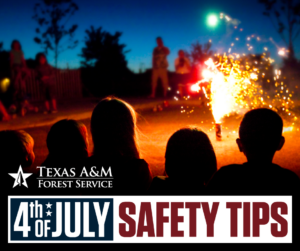Prevent fires from fireworks during Fourth of July
Hot, dry conditions persist through Independence Day
As Texans make plans to celebrate the Fourth of July, Texas A&M Forest Service encourages everyone to be careful with any outdoor activity that may cause a spark.
Approximately 90% of wildfires are caused by humans and their activities, and the Fourth of July is one of the top days for reported wildfires because of activities like grilling and fireworks.
Texas A&M Forest Service and local fire officials advise the public to be aware of the very warm and dry conditions that may contribute to wildfire activity through the holiday. While large, resistant wildfires are not expected, much of the state is still experiencing various levels of drought and little to no rainfall has fallen across north and northeast Texas since early June. Hot and dry weather conditions reduce the moisture content in grass and woody vegetation, which increases the potential for wildfire ignitions.
“As we start to observe typical summer weather with conditions becoming hotter and drier, we anticipate wildfire activity to increase,” said Wes Moorehead, Texas A&M Forest Service fire chief. “State and local firefighters are prepared to respond quickly but we need Texans to be careful and prevent wildfire ignitions while conditions are hot and dry.”
Firework safety
The safest way to enjoy fireworks is to attend a public show hosted by professionals. If you plan to set off your own fireworks:
- Always check for and comply with local government officials’ burn bans or other restrictions.
- Read and follow all warnings and instruction labels on fireworks.
- Use fireworks only under close adult supervision and in safe areas away from structures, dry grass and brush.
- Keep a hose, bucket of water and wet towels nearby in case of a malfunction or fire.
- Dispose of used fireworks in a bucket of water.
- Never ignite fireworks in a container, especially a glass or metal container.
Preventing wildfires
To help prevent wildfires during hot and dry conditions:
- Avoid parking and idling in tall, dry grass. Catalytic converters can get hot enough to ignite the grass under a vehicle.
- Ensure chains and other metal parts aren’t dragging from your vehicle — they throw sparks.
- Avoid placing your grill near flammable vegetation or materials, never leave your grill unattended, and ensure coals are completely extinguished when you are done.
Burn bans and fireworks restrictions are determined by county governments. Texas A&M Forest Service does not determine, set or lift these restrictions. For information on burn bans, visit https://tfsweb.tamu.edu/burnbans/.
For additional wildfire prevention tips, visit https://tfsweb.tamu.edu/summerwildfires/.
Texas A&M Forest Service Contact: Information Officer, 979-255-0591, [email protected]






